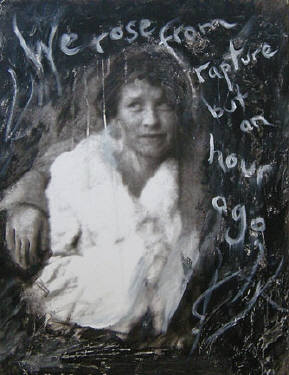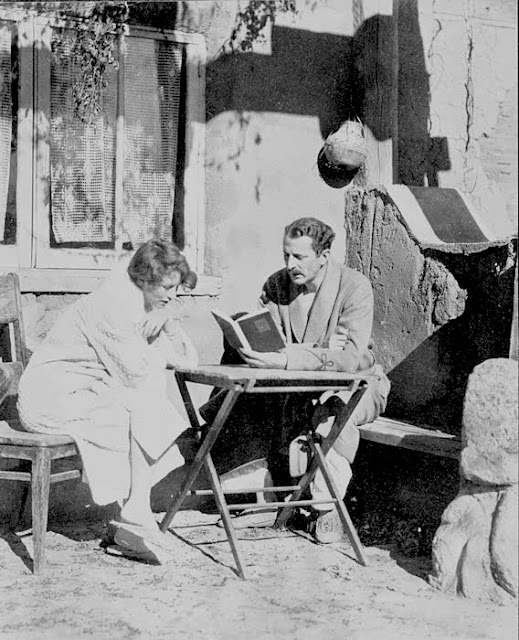To a Young Poet
I miss him in the weeping of the rain;
I want him at the shrinking of the tide;
The old snows melt from every mountain-side,
And last year’s leaves are smoke in every lane;
But last year’s bitter loving must remain
Heaped on my heart, and my old thoughts abide.
There are a hundred places where I fear
To go,—so with his memory they brim.
And entering with relief some quiet place
Where never fell his foot or shone his face
I say, “There is no memory of him here!”
And so stand stricken, so remembering him.
“I think I should have loved you presently”
And lifted honest eyes for you to see,
And caught your hand against my cheek and breast;
And all my pretty follies flung aside
That won you to me, and beneath your gaze,
Naked of reticence and shorn of pride,
Spread like a chart my little wicked ways.
I, that had been to you, had you remained,
But one more waking from a recurrent dream,
Cherish no less the certain stakes I gained,
And walk your memory’s halls, austere, supreme,
A ghost in marble of a girl you knew
Who would have loved you in a day or two.
“What lips my lips have kissed, and where, and why”
Under my head till morning; but the rain
Is full of ghosts tonight, that tap and sigh
Upon the glass and listen for reply,
And in my heart there stirs a quiet pain
For unremembered lads that not again
Will turn to me at midnight with a cry.
Thus in the winter stands the lonely tree,
Nor knows what birds have vanished one by one,
Yet knows its boughs more silent than before:
I cannot say what loves have come and gone,
I only know that summer sang in me
A little while, that in me sings no more.
by Edna St. Vincent Millay, 1892-1950
Time cannot break the bird’s wing from the bird.
Bird and wing together
Go down, one feather.
No thing that ever flew,
Not the lark, not you,
Can die as others do.
God's World
by Edna St. Vincent Millay, 1892-1950
O world, I cannot hold thee close enough!
O world, I cannot hold thee close enough!
Thy winds, thy wide grey skies!
Thy mists, that roll and rise!
Thy woods, this autumn day, that ache and sag
And all but cry with colour! That gaunt crag
To crush! To lift the lean of that black bluff!
World, World, I cannot get thee close enough!
Long have I known a glory in it all,
But never knew I this;
Here such a passion is
As stretcheth me apart,—Lord, I do fear
Thou’st made the world too beautiful this year;
My soul is all but out of me,—let fall
No burning leaf; prithee, let no bird call.
“Time does not bring relief; you all have lied”
“Time does not bring relief; you all have lied”
by Edna St. Vincent Millay, 1892-1950
Time does not bring relief; you all have lied
Who told me time would ease me of my pain! I miss him in the weeping of the rain;
I want him at the shrinking of the tide;
The old snows melt from every mountain-side,
And last year’s leaves are smoke in every lane;
But last year’s bitter loving must remain
Heaped on my heart, and my old thoughts abide.
There are a hundred places where I fear
To go,—so with his memory they brim.
And entering with relief some quiet place
Where never fell his foot or shone his face
I say, “There is no memory of him here!”
And so stand stricken, so remembering him.
“I think I should have loved you presently”
by Edna St. Vincent Millay, 1892-1950
I think I should have loved you presently,
And given in earnest words I flung in jest;And lifted honest eyes for you to see,
And caught your hand against my cheek and breast;
And all my pretty follies flung aside
That won you to me, and beneath your gaze,
Naked of reticence and shorn of pride,
Spread like a chart my little wicked ways.
I, that had been to you, had you remained,
But one more waking from a recurrent dream,
Cherish no less the certain stakes I gained,
And walk your memory’s halls, austere, supreme,
A ghost in marble of a girl you knew
Who would have loved you in a day or two.
“What lips my lips have kissed, and where, and why”
by Edna St. Vincent Millay, 1892-1950
What lips my lips have kissed, and where, and why,
I have forgotten, and what arms have lainUnder my head till morning; but the rain
Is full of ghosts tonight, that tap and sigh
Upon the glass and listen for reply,
And in my heart there stirs a quiet pain
For unremembered lads that not again
Will turn to me at midnight with a cry.
Thus in the winter stands the lonely tree,
Nor knows what birds have vanished one by one,
Yet knows its boughs more silent than before:
I cannot say what loves have come and gone,
I only know that summer sang in me
A little while, that in me sings no more.
 |
| Artist: Lawrence Ferlinghetti, Title: Edna St. Vincent Millay |
Bio - Poetry Foundation
More Poems by the poet - http://www.poetryfoundation.org/bio/edna-st-vincent-millay#about
Bio - Wikipedia - Edna St. Vincent Millay (February 22, 1892 – October 19, 1950) was an American lyrical poet and playwright. She received the Pulitzer Prize for Poetry in 1923, the third woman to win the award for poetry, and was also known for her feminist activism and her many love affairs. She used the pseudonym Nancy Boyd for her prose work. The poet Richard Wilbur asserted, "She wrote some of the best sonnets of the century."
 |
| Arthur Davison Ficke reading to Edna St. Vincent Millay |

No comments:
Post a Comment